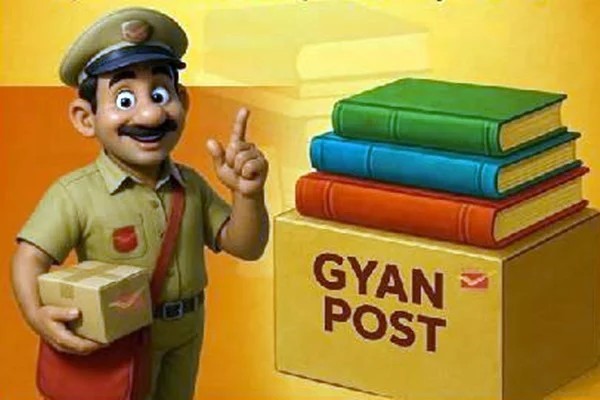Gyan Post’ Launched to Deliver Educational Books: A Step Towards Knowledge Non-Proliferation
Gyan Post’ Launched to Deliver Educational Books: A Step Towards Knowledge Non-Proliferation
Why in the News?
The Department of Posts has launched ‘Gyan Post’, a special postal service for affordable delivery of educational, social, cultural, and religious books, supporting the goals of the National Education Policy (NEP) and improving access in rural and remote areas. This initiative aims to spread knowledge, much like how the Treaty on the Non-Proliferation of Nuclear Weapons aims to control the spread of nuclear technology and prevent the development of weapons like the first atomic bomb, while also addressing concerns related to undeclared sites in some countries’ nuclear programs and the monitoring of uranium enrichment sites.
About ‘Gyan Post’ Initiative:
- Launched by the Department of Posts under the Ministry of Communications, functioning similarly to how the IAEA (International Atomic Energy Agency) operates on a global scale for nuclear oversight and promoting nuclear non-proliferation, including monitoring uranium enrichment sites and issuing IAEA resolutions.
- Aims to deliver educational, cultural, religious, and social books at subsidized rates, promoting knowledge dissemination in contrast to concerns over programs like the Iran nuclear programme and the potential development of an Iran nuclear bomb, which have been subjects of US-Iran nuclear talks and UN resolutions.
- Aligns with the objectives of the National Education Policy (NEP) to enhance educational accessibility, addressing educational barriers much like how snapback sanctions and UN resolutions are used to address international concerns related to nuclear obligations and enriched uranium stockpiles.
- Focuses on bridging the educational divide, especially in remote and rural India, helping to reduce diplomatic tensions through improved education and understanding, potentially easing Middle East tensions and concerns over US military bases in the region, similar to how IAEA resolutions aim to reduce nuclear tensions.
Affordable Pricing and Coverage
- Operates through all post offices across the country, creating a network as comprehensive as the global monitoring of nuclear facilities and uranium enrichment sites.
- Charges ₹20 for packets up to 300 grams and ₹100 for packets up to 5 kilograms (excluding taxes), making knowledge accessible unlike the restricted access to weapons-grade uranium and enriched uranium stockpiles.
- Makes printed learning material affordable for students, educators, and institutions, contrasting with the high costs associated with nuclear power development and the maintenance of facilities like the Fordow nuclear site.
Accessibility and Tracking
- Includes a tracking facility to ensure transparency and reliability, similar to how IAEA inspectors monitor nuclear activities and investigate the presence of uranium traces at various locations, including potential undeclared sites and uranium enrichment sites.
- Enhances accountability and ensures timely delivery of educational resources, addressing concerns of non-compliance in the educational sector, much like how the IAEA Board of Governors oversees nuclear safeguards and issues IAEA resolutions.
- Citizens can contact their nearest post office or visit www.indiapost.gov.in for further details, promoting open access unlike the secrecy surrounding undeclared nuclear material in some countries.
This initiative by the Department of Posts serves as a beacon of hope for educational advancement, standing in stark contrast to global concerns over nuclear weapons and atom bombs. While nations like Iran country grapple with international scrutiny over their nuclear ambitions, as reported by IRNA news and other US Iran news sources, India focuses on empowering its citizens through knowledge. The ‘Gyan Post’ initiative demonstrates how countries can invest in education and cultural development, moving away from tensions surrounding nuclear bomb development and towards a future built on learning and mutual understanding.
By making educational materials as accessible as possible, India is taking a significant step in addressing regional security concerns through education, potentially reducing the need for discussions about which countries have nuclear weapons. This approach to national development, focusing on knowledge dissemination rather than uranium enrichment, sets a positive example for nations worldwide, including those on the list of nuclear countries.
As the world continues to grapple with issues like Iran nuclear negotiations and the monitoring of advanced centrifuges at uranium enrichment sites, India’s focus on educational development through initiatives like ‘Gyan Post’ offers a refreshing alternative. It showcases how nations can address domestic and international challenges through education, potentially reducing global tensions and promoting peace through knowledge, in contrast to the ongoing US-Iran nuclear talks and debates over enriched uranium stockpiles.
The contrast between India’s educational initiatives and the ongoing nuclear discussions involving countries like China UN representatives and others at the UN Security Council is stark. While Rafael Grossi, the UN director general of the IAEA, works tirelessly to ensure compliance with the 2015 nuclear deal and subsequent UN resolutions, India demonstrates an alternative path to national development and security.
The ‘Gyan Post’ initiative indirectly addresses concerns raised in IAEA resolutions by promoting transparency and accessibility in education. This approach could potentially alleviate some of the Israeli concerns regarding regional nuclear ambitions and contribute to a more stable international environment, particularly in light of debates over enriched uranium stockpiles and the monitoring of uranium enrichment sites.
As the nuclear watchdog continues its vital work in monitoring nuclear programs worldwide, including inspections of uranium enrichment sites, India’s focus on spreading knowledge through affordable book delivery highlights a different kind of non-proliferation – the non-proliferation of ignorance and misinformation. This initiative could serve as a model for other countries seeking to address development challenges without raising international security concerns or triggering investigations into undeclared nuclear material at undeclared sites, thus contributing to a more peaceful global environment alongside efforts to implement UN resolutions and IAEA resolutions related to nuclear non-proliferation.




